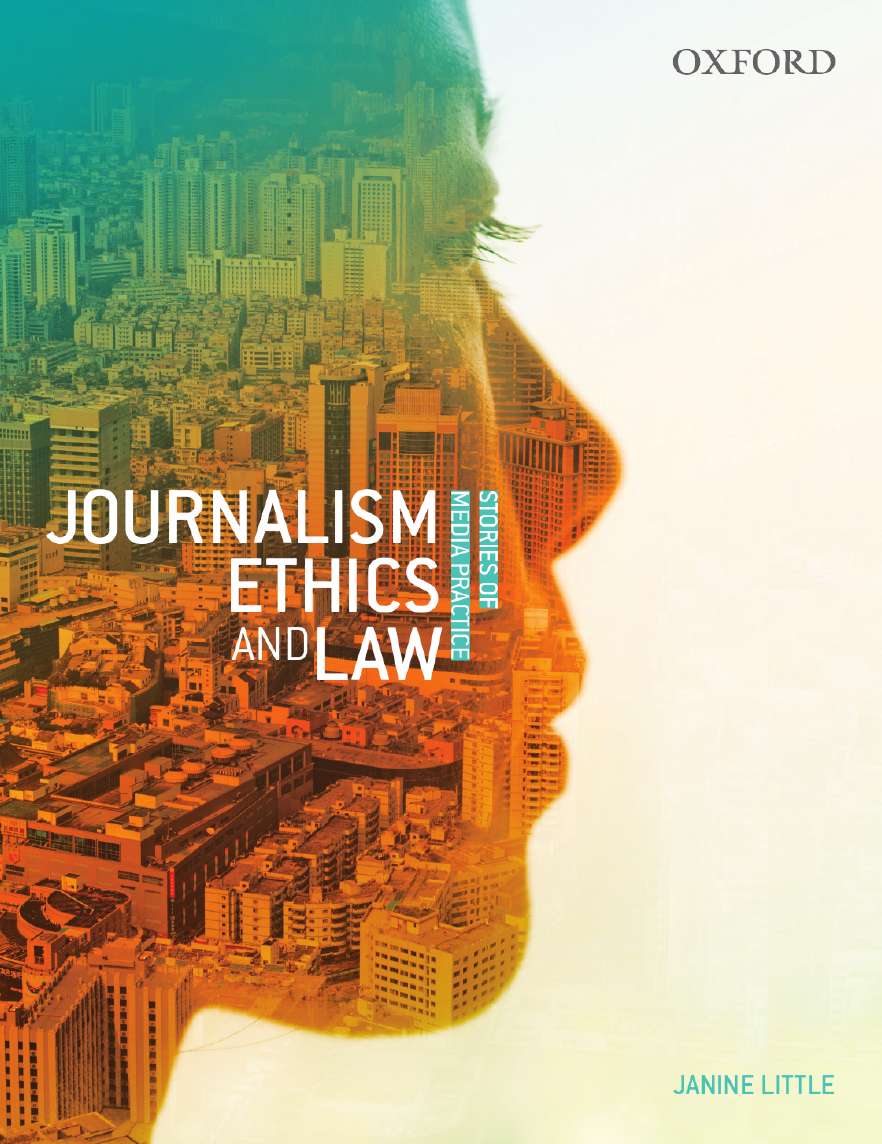Journalism Ethics and Law ebook

Journalism Ethics and Law ebook
|
ISBN: |
9780195588255 |
|
Binding: |
Ebook |
|
Published: |
4 Oct 2013 |
|
Availability: |
Available
|
|
Series: |
$79.95 AUD
$91.99 NZD
Add To Cart Add To CartOther options: Paperback $89.95 AUD $102.99 NZD
Request an inspection copyDescription
Journalism Ethics and Law ignites the conversation about journalism ethics and the function of the law in today’s media. Emphasising a practical work-based approach to develop best practice multimedia journalism; this book presents a combined ethics and law experience for journalism students and uses stories and case studies to highlight the most significant questions for the practice of law and ethics today.
Journalism Ethics and Law offers readers a new way about thinking about journalism ethics and empowers future journalists to make good and ethical decisions in the field.
Features
- Up-to-date coverage of the inquiries into media regulation and standards, Australian current affairs, recent case studies and examples from the contemporary media environment
- Full of interactive activities and tips develop further knowledge of journalism as a distinct media practice
- Written in a lively, engaging style and content is made accessible with plain-speaking language.
Contents
1. Ethical Journalism after News of the World
What this book does (and does not do)
Ethical discussions in Australia after News of the World
What is journalism? Journalism as a distinct entity
2. An Ethical Ideal Worth Aiming for: Journalism and Best Practice
What ethics means: Explanation and definitions
Two approaches to best practice
Conclusion
3. Pragmatic and Bold: The Journalist and the Media
Ethical disasters or bold engagement? Why perspective and positioning affect journalists
Case studies in disaster
Conclusion: Towards journalistic engagement
4. Ethical Stories: Disasters, and DJs
What questions of ethics mean for the media
How Australian journalists code their ethics
How to relate specific points in Australia’s ethical codes to actual stories:
Some examples ACMA and the shock jock
Conclusion: Towards your ethical engagement
5. Freedom as Idea and Practice: Ethics, ‘Hacktivism’ and Human Rights Henk Huijser and Janine Little
How the idea of ‘freedom’ relates to journalism ethics and law Freedom and journalism ethics
The public right to know and its relationship to civil liberties for individuals
Why ‘hacktivism’ and the command of information is now being called ‘terrorism’
Conclusion
6. Trial by Media I: Women in the Private-Public Divide
Azaria Chamberlain and Dianne Brimble—ethics and spectacle
Credibility and sources: Women as suspects
Protecting the course of justice: Trial by media and the Dianne Brimble case
The St Kilda schoolgirl Facebook photo scandal
Privacy and breach of confidence: Australian legal provisions
Conclusion: Privacy and human rights
7. Trial by Media II: Contempt of Court and the Right to a Fair Trial
Why the issue of trial by media tests journalists’ understanding of public interest
On the trail of Dennis Ferguson
‘Across the night sky’: The Farquharson trial and the tragedy of a triple child murder
The faces of Arthur Freeman
Conclusion: By doing the job fairly, the journalist acts well
8. Hurt Reputations: Introduction to Defamation Law and Cases
What is defamation?
How Australian defamation law developed
How Australian defamation law became (almost) uniform
Why you need to learn about defamation: The short version
How to measure the risk of defamation
The three-point test
A selective case law history: From shower scenes to war crimes
Conclusion: Defamation and responsibility—back to journalism
9 . Defamation Defences
How defending defamation relates to public memory
The defamation defences
What has it got to do with journalists?
Conclusion: How free are we to speak?
10. Animal Rights and Public Interest: How Journalists Advocating for Animals Helped Shape Australian Law
Why animals matter to journalism
How animal rights advocacy led to tests of the public interest in Australian law
Why public interest is not always a reliable defence
Secret video 11 years on
Comparison story: Anna Krien’s Us and Them
Conclusion: Why this matters for journalism as a social practice
11. When Trolls Ruled the Twitterverse: Journalism and Social Media
Why trolls signal an essential ethical issue for journalism—and why social media vigilantes are related
How cyber-bullying and other misuses of the internet relate to journalism: The case studies
The difference between media sensationalism and journalistic enquiry
Social media and fairness
Conclusion: Why journalism ethics matters in such cases, and what you can do about it
12. The Competition and Consumer Act for Journalists
Misleading representation
Relevant sections for journalists in the Competition and Consumer Act 2010
Misleading and deceptive conduct: A brief biography
Conclusion
13. Copyright for Journalists
How Australian law protects copyright
What copyright covers
Copyright’s rationale
The internet and copyright Conclusion
14. Conclusion – Continuing Journalism
Authors
Janine Little is a senior lecturer in journalism at Deakin University and has taught media law and ethics at three Australian universities. She wrote and co-designed an online work-integrated training program for professional APN News and Media journalists, and has also chaired and examined large journalism courses at Deakin, USQ, QUT, and UQ.
Sample Pages
Read a sample chapter from Journalism Ethics and Law